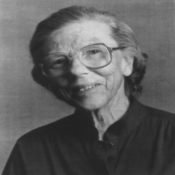


I was interviewing Mabel Smith in her large, airy farmhouse. She's a sensible, duty-minded woman, who likes to get involved in community affairs. Married in January of '39, she spent the war time coming up weekends in the summer to Rhode Island by train and raising three children.
I can remember being here in Matunuck at Labor Day time when the Germans marched into Poland. I was very aware of the buildup, and of the fear of war that people had. In the summer of '37 I took a trip to Europe, and went to Austria. People there were very enthusiastic about Hitler, but you did wonder. Oh, they were for Hitler, they were. He encouraged young people to have great pride in the Aryan race and in the German nation, and he encouraged all sorts of athletic disciplines, the great strong Germanic, the master race, as he called it. Oh, it was a little scary even then. I didn't know too much about the anti-Semitism, but I was aware of it. I knew it was part of Hitler's build-up, and his policy. I can remember when Chamberlain made his agreement, and sort of sold out the Czechoslovakian Sudetenland. That made a great many people uneasy. He said he was getting peace for our times, but you felt that it couldn't last.
After the war in Europe started, we were constantly talking about whether America would be drawn into the war, and just what we should do. Once things had gotten further along, we felt very definitely that we were doing the right thing by going in. Some people didn't agree with that, they felt that maybe Hitler had the right idea of how to run a country. But I didn't ever feel that way. I did feel that war was wrong, and wished that we could stay out of it. But then, when it got beyond a certain point, I rather wholeheartedly supported it.
My husband was in the textile business. He didn't go into the service because textile manufacturing was considered a strategic industry. They felt that those who had management jobs in these big companies that were completely converted to government production were doing something more important than going in the service. He always did feel a bit badly about that, whether some people thought he was shirking. My three brothers-in-law (my sisters' husbands) were in the service, so you had a little funny feeling about that.
One of my brothers-in-law was wounded in the Battle of the Bulge in December of '43 [sic]. He had kind of a bad time of it, but still came home safely. Another on of my brothers-in-law was a doctor on a ship in the Pacific, and the third was a lieutenant colonel. They both returned safely.
Things were rationed during the war. You got a book for every member of the family, even though they were young. Sugar and meat, and of course gasoline, were rationed. We bicycled a great deal because of the gas rationing. I had a little seat on the back of my bike for my little boy. I can remember going to a dance and bicycling home four miles at two in the morning.
When the war finally ended, my sister-in-law and I were sharing this house. She remembered how people had wanted to celebrate the end of World War I, and got our four little boys all rigged up with something to bang and make a lot of noise with, and they marched around. It was just something to remember the day by. But there was a remarkable feeling that it was finally over.
Looking back at the war now, how did the war affect your overall life?
Well, I suppose in a philosophical way the war opened our eyes to a lot of social concerns and what is worth fighting for. It was kind of a time that one dates things by, before and after. Before, we thought that our way was right -- that we had the best possible country. A lot has happened to make one wonder.
Copyright 1995